Unit 7 You’re supposed to shake hands导学案(6课时)
文档属性
| 名称 | Unit 7 You’re supposed to shake hands导学案(6课时) | 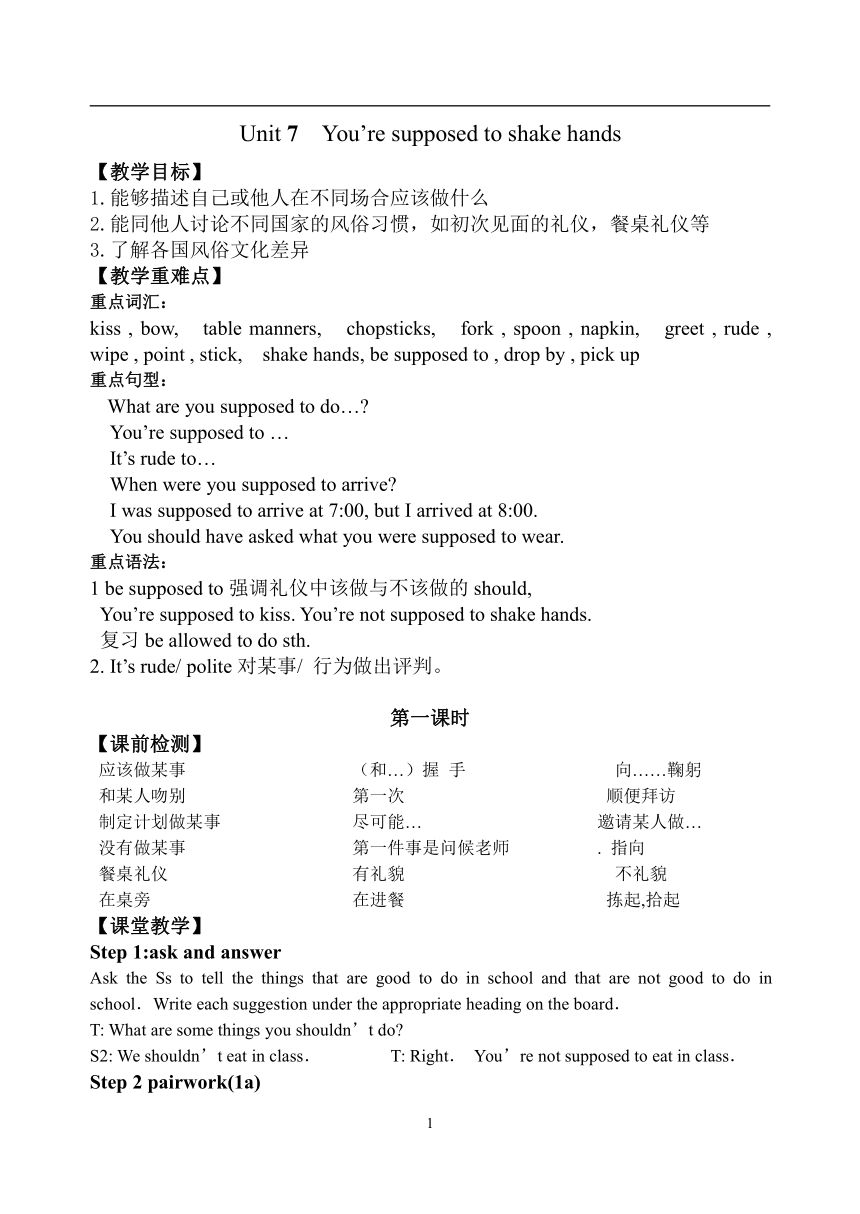 | |
| 格式 | zip | ||
| 文件大小 | 26.0KB | ||
| 资源类型 | 教案 | ||
| 版本资源 | 鲁教版(五四学制) | ||
| 科目 | 英语 | ||
| 更新时间 | 2014-05-20 15:44:34 | ||
图片预览

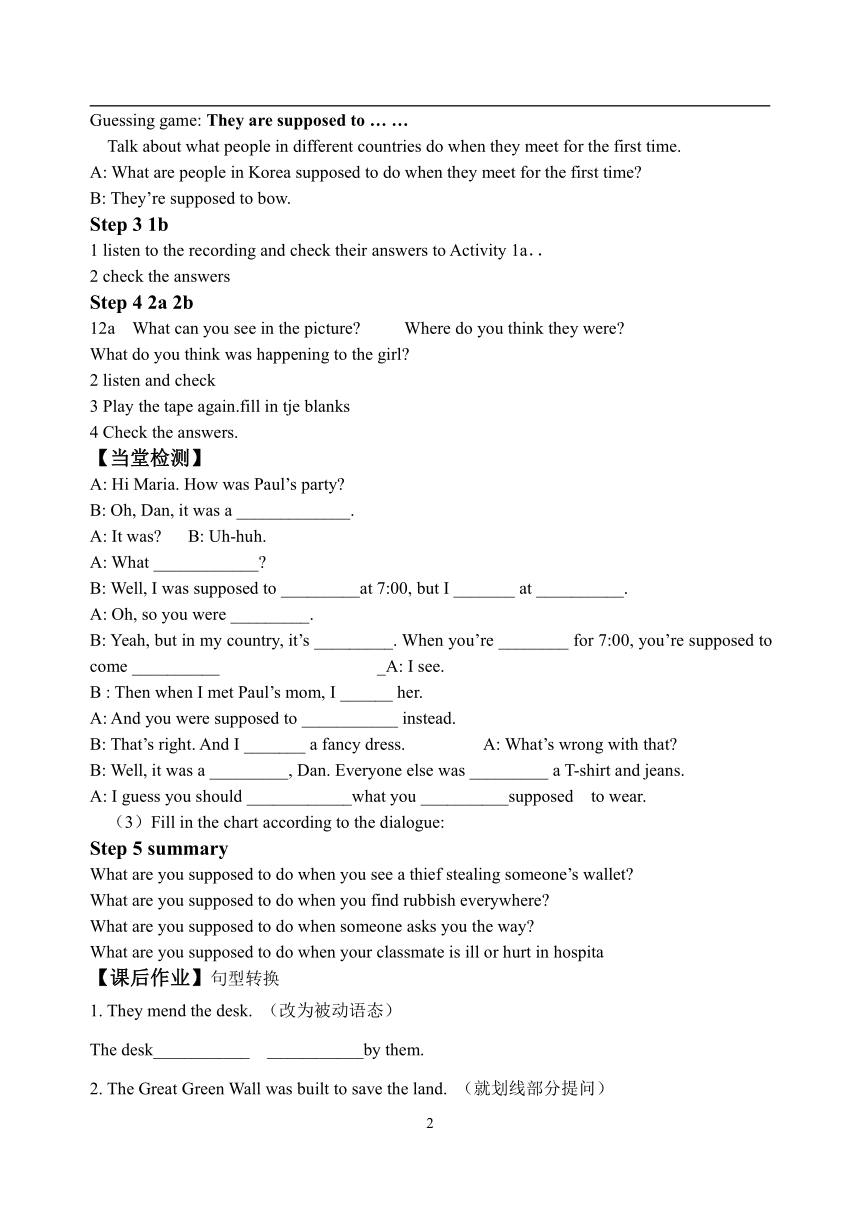
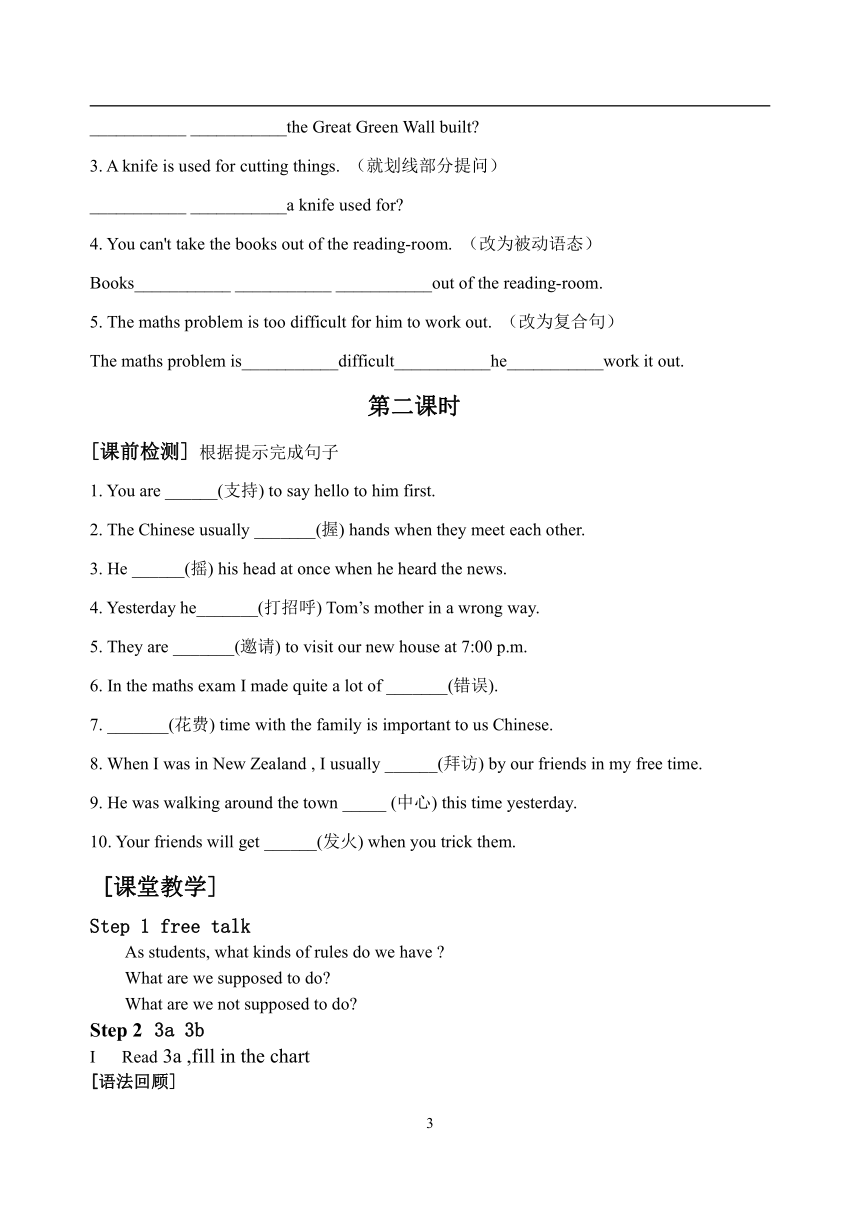
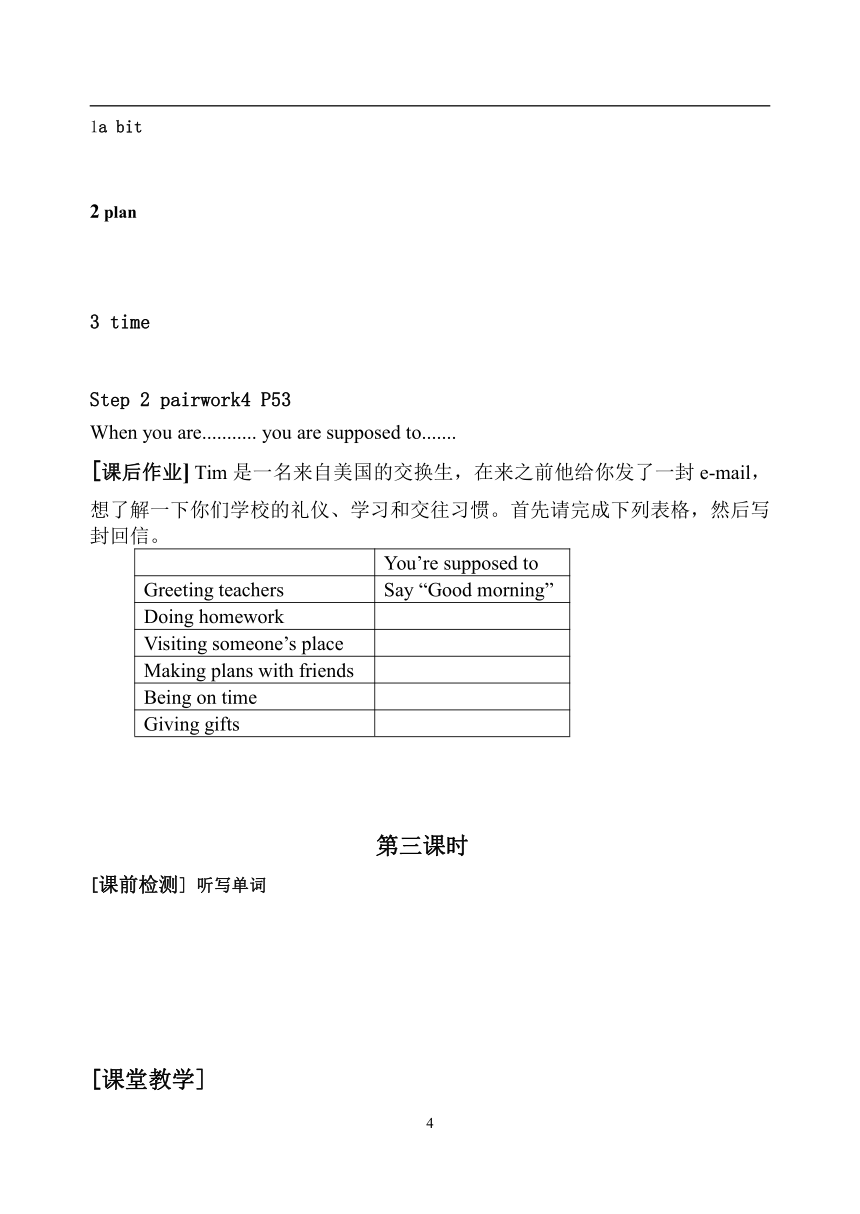
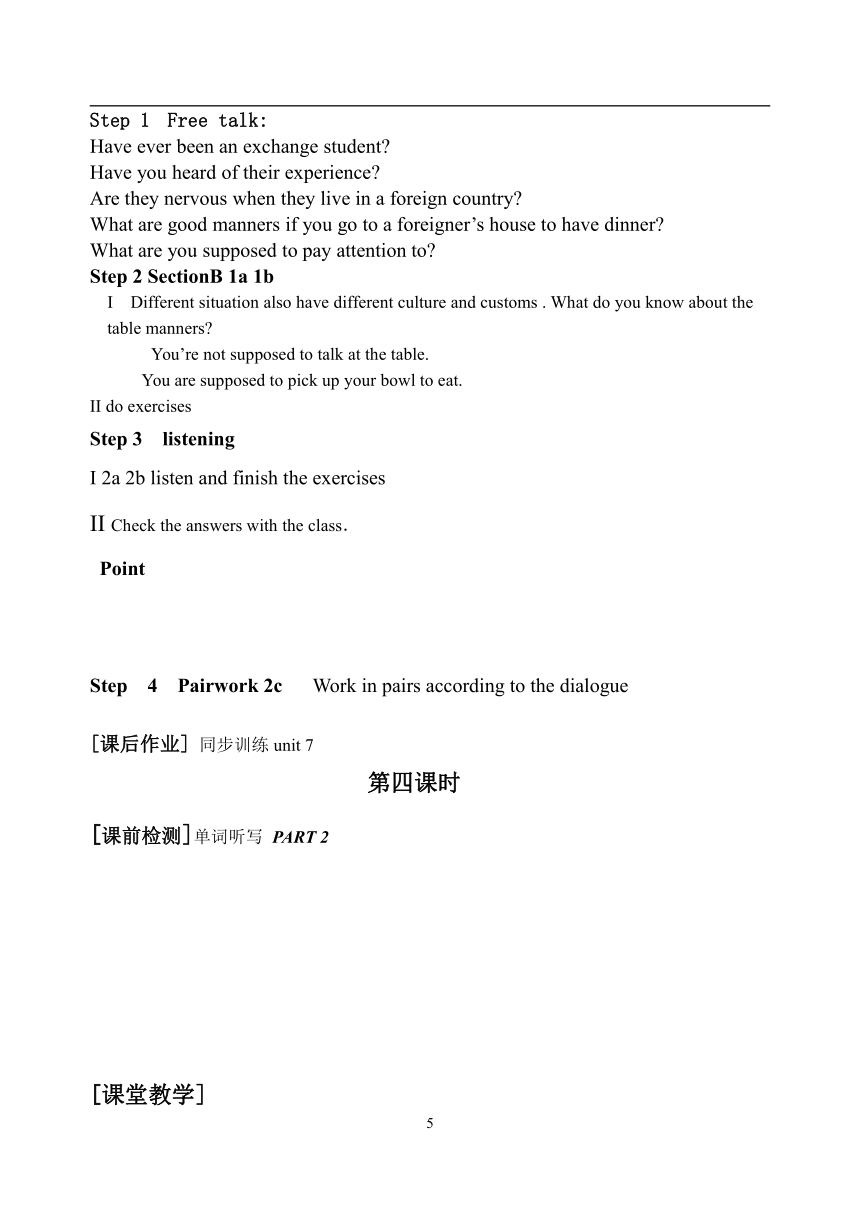
文档简介
Unit 7 You’re supposed to shake hands
【教学目标】
1.能够描述自己或他人在不同场合应该做什么
2.能同他人讨论不同国家的风俗习惯,如初次见面的礼仪,餐桌礼仪等
3.了解各国风俗文化差异
【教学重难点】
重点词汇:
kiss , bow, table manners, chopsticks, fork , spoon , napkin, greet , rude , wipe , point , stick, shake hands, be supposed to , drop by , pick up
重点句型:
What are you supposed to do…
You’re supposed to …
It’s rude to…
When were you supposed to arrive
I was supposed to arrive at 7:00, but I arrived at 8:00.
You should have asked what you were supposed to wear.
重点语法:
1 be supposed to强调礼仪中该做与不该做的should,
You’re supposed to kiss. You’re not supposed to shake hands.
复习be allowed to do sth.
2. It’s rude/ polite对某事/ 行为做出评判。
第一课时
【课前检测】
应该做某事 (和…)握 手 向……鞠躬
和某人吻别 第一次 顺便拜访
制定计划做某事 尽可能… 邀请某人做…
没有做某事 第一件事是问候老师 . 指向
餐桌礼仪 有礼貌 不礼貌
在桌旁 在进餐 拣起,拾起
【课堂教学】
Step 1:ask and answer
Ask the Ss to tell the things that are good to do in school and that are not good to do in school.Write each suggestion under the appropriate heading on the board.
T: What are some things you shouldn’t do
S2: We shouldn’t eat in class. T: Right. You’re not supposed to eat in class.
Step 2 pairwork(1a)
Guessing game: They are supposed to … …
Talk about what people in different countries do when they meet for the first time.
A: What are people in Korea supposed to do when they meet for the first time
B: They’re supposed to bow.
Step 3 1b
1 listen to the recording and check their answers to Activity 1a..
2 check the answers
Step 4 2a 2b
12a What can you see in the picture Where do you think they were
What do you think was happening to the girl
2 listen and check
3 Play the tape again.fill in tje blanks
4 Check the answers.
【当堂检测】
A: Hi Maria. How was Paul’s party
B: Oh, Dan, it was a _____________.
A: It was B: Uh-huh.
A: What ____________
B: Well, I was supposed to _________at 7:00, but I _______ at __________.
A: Oh, so you were _________.
B: Yeah, but in my country, it’s _________. When you’re ________ for 7:00, you’re supposed to come __________ _A: I see.
B : Then when I met Paul’s mom, I ______ her.
A: And you were supposed to ___________ instead.
B: That’s right. And I _______ a fancy dress. A: What’s wrong with that
B: Well, it was a _________, Dan. Everyone else was _________ a T-shirt and jeans.
A: I guess you should ____________what you __________supposed to wear.
(3)Fill in the chart according to the dialogue:
Step 5 summary
What are you supposed to do when you see a thief stealing someone’s wallet
What are you supposed to do when you find rubbish everywhere
What are you supposed to do when someone asks you the way
What are you supposed to do when your classmate is ill or hurt in hospita
【课后作业】句型转换
1. They mend the desk. (改为被动语态)
The desk___________ ___________by them.
2. The Great Green Wall was built to save the land. (就划线部分提问)
___________ ___________the Great Green Wall built
3. A knife is used for cutting things. (就划线部分提问)
___________ ___________a knife used for
4. You can't take the books out of the reading-room. (改为被动语态)
Books___________ ___________ ___________out of the reading-room.
5. The maths problem is too difficult for him to work out. (改为复合句)
The maths problem is___________difficult___________he___________work it out.
第二课时
[课前检测] 根据提示完成句子
1. You are ______(支持) to say hello to him first.
2. The Chinese usually _______(握) hands when they meet each other.
3. He ______(摇) his head at once when he heard the news.
4. Yesterday he_______(打招呼) Tom’s mother in a wrong way.
5. They are _______(邀请) to visit our new house at 7:00 p.m.
6. In the maths exam I made quite a lot of _______(错误).
7. _______(花费) time with the family is important to us Chinese.
8. When I was in New Zealand , I usually ______(拜访) by our friends in my free time.
9. He was walking around the town _____ (中心) this time yesterday.
10. Your friends will get ______(发火) when you trick them.
[课堂教学]
Step 1 free talk
As students, what kinds of rules do we have
What are we supposed to do
What are we not supposed to do
Step 2 3a 3b
I Read 3a ,fill in the chart
[语法回顾]
1a bit
2 plan
3 time
Step 2 pairwork4 P53
When you are........... you are supposed to.......
[课后作业] Tim是一名来自美国的交换生,在来之前他给你发了一封e-mail,想了解一下你们学校的礼仪、学习和交往习惯。首先请完成下列表格,然后写封回信。
You’re supposed to
Greeting teachers Say “Good morning”
Doing homework
Visiting someone’s place
Making plans with friends
Being on time
Giving gifts
第三课时
[课前检测] 听写单词
[课堂教学]
Step 1 Free talk:
Have ever been an exchange student
Have you heard of their experience
Are they nervous when they live in a foreign country
What are good manners if you go to a foreigner’s house to have dinner
What are you supposed to pay attention to
Step 2 SectionB 1a 1b
I Different situation also have different culture and customs . What do you know about the
table manners
You’re not supposed to talk at the table.
You are supposed to pick up your bowl to eat.
II do exercises
Step 3 listening
I 2a 2b listen and finish the exercises
II Check the answers with the class.
Point
Step 4 Pairwork 2c Work in pairs according to the dialogue
[课后作业] 同步训练unit 7
第四课时
[课前检测]单词听写 PART 2
[课堂教学]
Step 1. free talk
What should we pay attention to when having dinner in France
Step 2 3a
I . Read the e-mail message and answer the questions.
1.Why was Wang Kun nervous before she arrived in France
2.Why did she have no reason to be nervous
3.How has her French improved
4.What is one particular challenge she is facing
5.What does she find surprising
II [小组讨论] Phrases and grammar
Write down
1 even
2 used
3 except /besides/but/与except for 的用法与区别
、 三者都可表示“除外”,但 besides 表示一种累加关系,意指“除了什么之外,还有……”;而 except 或 but 则表示一种排除关系,意指“除了什么之外,不再有……”。
Eg. Besides his wife,his daughter also went to see him.
除他妻子外,他女儿也去看过他(即妻子女儿都去看过他)。
Nobody went to see him except [but] his wife. 除他妻子外,没有一个人看过他(即只有他妻子去看过他)。
注:在否定句中,besides 也表示“除……之外不再有…… ”,与but, except 同义。
Eg. No one passed the exam besides [except] Jim. 除吉姆外,没一个人通过考试。
、 关于 but 与 except:
两者都可表示“除……外不再有……”,但含义上略有差别:but侧重指意义的几乎完整性,而 except 则侧重指后面除去的部分。
在现代英语中,but 的介词用法十分有限,其后常接名词、代词或动词不定式。but 常用在 every, any, no 和由这些词构成的复合词出现的句子中,并放在 everything, anywhere, nobody 等以及 all, who 之后。
Eg. Everyone knows it but you. 除你之外大家都知道。
I haven’t told anybody but you. 除你之外,我没告诉任何人。
No one but he [him] showed much interest in it.
除他之外没有一个人对此有很大兴趣。
、关于 except 与 except for:
except 主要用来谈论同类的东西,而 except for 则主要用来谈论不同类的东西,有时含有惋惜之意。如:
All compositions are well written except yours.
除了你的作文外,其他的作文都写得很好。
Eg. His composition is good except for a few spelling mistakes.
他的作文写得不错,只是有几处拼写错误。
注:若用于句首,则 except for 与 except 同义(但 except 通常不用于句首)。
[当堂检测]1.我的寄宿家庭很友好,他们特意让我感觉无拘束
2.我最大的挑战是学习如何在餐桌上举止恰当.
3.在法国,你不应该把面包放在自己的盘子里.
4.当你在餐桌盘,把手放在你自己的大腿上是非常粗鲁的.
5.记住每一件事很困难,但我正渐渐习惯于这些事情.
[课后作业]读表格,根据其内容完成下面句子:
What do you do when you… USA Japan
meet someone shake hands bow
eat noodles eat them without noise make noise
are invited to a party be there a little bit late be there on time
want to visit a friend call them first make plans with them
1. In USA, when you meet someone, you’re supposed to________________, while in Japan you’re supposed to____________.
2. In USA, when you eat noodles, you’re supposed to_______________, while in Japan you’re supposed to______________.
3. In USA, when you are invited to a party, you’re supposed to________________, while in Japan you’re supposed to____________.
4. In USA, when you meet someone, you’re supposed to________________, while in Japan you’re supposed to____________.
第五课时 (reading)
[课前检测] Can you read the following expressions How would you usually write them in English
F2F_____________CUL8r!_________________BTW______________ CU!______________How R U _____________BRB______________ CU2morrow___________________ ASAP____________________
[课堂教学]
Step 1 Free talk
Step 2 reading
try to fill in the blanks by yourself
Paragraph Main idea
Paragraph 1 1. E-mail English is a new kind of ____ English. People use it to ________
Paragraph 2 2. Email English comes from a computer program called _____, which people use to _________ with others
Paragraph 3 3. E-mail English mostly has 2 types of words : __________ and __________
Paragraph 4 4. You can use ________________to show the __________ you are feeling.
Paragraph 5 5. You should use e-mail English at the _____________
IIIgroupwork Find out the phrases and ask some qoestions
P1
P 2
III act out
第六—七 课时 (复习练习)
[本节任务] 1 完成讲授selfcheck的相关练习
2掌握本单元重点词汇 句型
[课堂教学]
Step 1 selfcheck
1 fill in the blanks and check the answers
2 Answer the questions:
Begin
decide
Step2 基础巩固
I find out the importances in groups
II exercises
单元检测
I Useful Phrases:
1.握手____________ 2.应该做……___________
3.第一次见面____________4.顺便拜访_____________
5.计划做某事____________6.对…..随意____________
7.毕竟____________ 8.对……非常重要___________
9.发出噪声____________ 10.沿着大街走_____________
11.特地做某事___________
12.使某人感到宾至如归______________
13.习惯于……________/过去常常_______/被用来做……______
14.从……开始_____________ 15.书面英语____________
16.对……不熟悉____________17.自学_________/_________
18.忍不住……_____________19.捡起;端起________
20.指向;朝向____________21.餐桌礼仪____________
II 重点句子:
1.在美国,人们初次见面应该干什么?_________________________
他们应该握手。他们不应该鞠躬。_________________________________.
2.你本应该什么时候到?我本应该在8点钟到。
_______________________________ __________________________.
3.你应该提前问问你应该穿什么。
You should _____ _______ what you were supposed to.
4.我发现记住这一切很难。
I find _____ difficult _____ _________ everything.
5.使用电子邮件英语帮助你写得更快。
________ e-mail English _____ you write ________.
6.在大街上边走边吃是粗鲁的。
It’s rude______ ______ while _______ _______the street.
III 用所给词的适当形式填空
1.He left without__________(say) anything.
2.He was supposed ___________ (arrive)at 7:00.
3.It’s easy, so we can learn it by__________(we).
4.We Chinese are used to________(eat)with chopsticks.
5.__________(give) compliments is polite.
6.Pople in Japan and China behave _____________(different).
7.Switzerland is the land of __________(watch).
8._________(Korea)are supposed to bow when they meet for the first time.
9..There is a coin on the floor. Please _________.
pick it B. pick it up C. pick up it
10. We go to school ___ foot and eat meals _____ chopsticks.
A. by; by C. on, with D. on, use
10
【教学目标】
1.能够描述自己或他人在不同场合应该做什么
2.能同他人讨论不同国家的风俗习惯,如初次见面的礼仪,餐桌礼仪等
3.了解各国风俗文化差异
【教学重难点】
重点词汇:
kiss , bow, table manners, chopsticks, fork , spoon , napkin, greet , rude , wipe , point , stick, shake hands, be supposed to , drop by , pick up
重点句型:
What are you supposed to do…
You’re supposed to …
It’s rude to…
When were you supposed to arrive
I was supposed to arrive at 7:00, but I arrived at 8:00.
You should have asked what you were supposed to wear.
重点语法:
1 be supposed to强调礼仪中该做与不该做的should,
You’re supposed to kiss. You’re not supposed to shake hands.
复习be allowed to do sth.
2. It’s rude/ polite对某事/ 行为做出评判。
第一课时
【课前检测】
应该做某事 (和…)握 手 向……鞠躬
和某人吻别 第一次 顺便拜访
制定计划做某事 尽可能… 邀请某人做…
没有做某事 第一件事是问候老师 . 指向
餐桌礼仪 有礼貌 不礼貌
在桌旁 在进餐 拣起,拾起
【课堂教学】
Step 1:ask and answer
Ask the Ss to tell the things that are good to do in school and that are not good to do in school.Write each suggestion under the appropriate heading on the board.
T: What are some things you shouldn’t do
S2: We shouldn’t eat in class. T: Right. You’re not supposed to eat in class.
Step 2 pairwork(1a)
Guessing game: They are supposed to … …
Talk about what people in different countries do when they meet for the first time.
A: What are people in Korea supposed to do when they meet for the first time
B: They’re supposed to bow.
Step 3 1b
1 listen to the recording and check their answers to Activity 1a..
2 check the answers
Step 4 2a 2b
12a What can you see in the picture Where do you think they were
What do you think was happening to the girl
2 listen and check
3 Play the tape again.fill in tje blanks
4 Check the answers.
【当堂检测】
A: Hi Maria. How was Paul’s party
B: Oh, Dan, it was a _____________.
A: It was B: Uh-huh.
A: What ____________
B: Well, I was supposed to _________at 7:00, but I _______ at __________.
A: Oh, so you were _________.
B: Yeah, but in my country, it’s _________. When you’re ________ for 7:00, you’re supposed to come __________ _A: I see.
B : Then when I met Paul’s mom, I ______ her.
A: And you were supposed to ___________ instead.
B: That’s right. And I _______ a fancy dress. A: What’s wrong with that
B: Well, it was a _________, Dan. Everyone else was _________ a T-shirt and jeans.
A: I guess you should ____________what you __________supposed to wear.
(3)Fill in the chart according to the dialogue:
Step 5 summary
What are you supposed to do when you see a thief stealing someone’s wallet
What are you supposed to do when you find rubbish everywhere
What are you supposed to do when someone asks you the way
What are you supposed to do when your classmate is ill or hurt in hospita
【课后作业】句型转换
1. They mend the desk. (改为被动语态)
The desk___________ ___________by them.
2. The Great Green Wall was built to save the land. (就划线部分提问)
___________ ___________the Great Green Wall built
3. A knife is used for cutting things. (就划线部分提问)
___________ ___________a knife used for
4. You can't take the books out of the reading-room. (改为被动语态)
Books___________ ___________ ___________out of the reading-room.
5. The maths problem is too difficult for him to work out. (改为复合句)
The maths problem is___________difficult___________he___________work it out.
第二课时
[课前检测] 根据提示完成句子
1. You are ______(支持) to say hello to him first.
2. The Chinese usually _______(握) hands when they meet each other.
3. He ______(摇) his head at once when he heard the news.
4. Yesterday he_______(打招呼) Tom’s mother in a wrong way.
5. They are _______(邀请) to visit our new house at 7:00 p.m.
6. In the maths exam I made quite a lot of _______(错误).
7. _______(花费) time with the family is important to us Chinese.
8. When I was in New Zealand , I usually ______(拜访) by our friends in my free time.
9. He was walking around the town _____ (中心) this time yesterday.
10. Your friends will get ______(发火) when you trick them.
[课堂教学]
Step 1 free talk
As students, what kinds of rules do we have
What are we supposed to do
What are we not supposed to do
Step 2 3a 3b
I Read 3a ,fill in the chart
[语法回顾]
1a bit
2 plan
3 time
Step 2 pairwork4 P53
When you are........... you are supposed to.......
[课后作业] Tim是一名来自美国的交换生,在来之前他给你发了一封e-mail,想了解一下你们学校的礼仪、学习和交往习惯。首先请完成下列表格,然后写封回信。
You’re supposed to
Greeting teachers Say “Good morning”
Doing homework
Visiting someone’s place
Making plans with friends
Being on time
Giving gifts
第三课时
[课前检测] 听写单词
[课堂教学]
Step 1 Free talk:
Have ever been an exchange student
Have you heard of their experience
Are they nervous when they live in a foreign country
What are good manners if you go to a foreigner’s house to have dinner
What are you supposed to pay attention to
Step 2 SectionB 1a 1b
I Different situation also have different culture and customs . What do you know about the
table manners
You’re not supposed to talk at the table.
You are supposed to pick up your bowl to eat.
II do exercises
Step 3 listening
I 2a 2b listen and finish the exercises
II Check the answers with the class.
Point
Step 4 Pairwork 2c Work in pairs according to the dialogue
[课后作业] 同步训练unit 7
第四课时
[课前检测]单词听写 PART 2
[课堂教学]
Step 1. free talk
What should we pay attention to when having dinner in France
Step 2 3a
I . Read the e-mail message and answer the questions.
1.Why was Wang Kun nervous before she arrived in France
2.Why did she have no reason to be nervous
3.How has her French improved
4.What is one particular challenge she is facing
5.What does she find surprising
II [小组讨论] Phrases and grammar
Write down
1 even
2 used
3 except /besides/but/与except for 的用法与区别
、 三者都可表示“除外”,但 besides 表示一种累加关系,意指“除了什么之外,还有……”;而 except 或 but 则表示一种排除关系,意指“除了什么之外,不再有……”。
Eg. Besides his wife,his daughter also went to see him.
除他妻子外,他女儿也去看过他(即妻子女儿都去看过他)。
Nobody went to see him except [but] his wife. 除他妻子外,没有一个人看过他(即只有他妻子去看过他)。
注:在否定句中,besides 也表示“除……之外不再有…… ”,与but, except 同义。
Eg. No one passed the exam besides [except] Jim. 除吉姆外,没一个人通过考试。
、 关于 but 与 except:
两者都可表示“除……外不再有……”,但含义上略有差别:but侧重指意义的几乎完整性,而 except 则侧重指后面除去的部分。
在现代英语中,but 的介词用法十分有限,其后常接名词、代词或动词不定式。but 常用在 every, any, no 和由这些词构成的复合词出现的句子中,并放在 everything, anywhere, nobody 等以及 all, who 之后。
Eg. Everyone knows it but you. 除你之外大家都知道。
I haven’t told anybody but you. 除你之外,我没告诉任何人。
No one but he [him] showed much interest in it.
除他之外没有一个人对此有很大兴趣。
、关于 except 与 except for:
except 主要用来谈论同类的东西,而 except for 则主要用来谈论不同类的东西,有时含有惋惜之意。如:
All compositions are well written except yours.
除了你的作文外,其他的作文都写得很好。
Eg. His composition is good except for a few spelling mistakes.
他的作文写得不错,只是有几处拼写错误。
注:若用于句首,则 except for 与 except 同义(但 except 通常不用于句首)。
[当堂检测]1.我的寄宿家庭很友好,他们特意让我感觉无拘束
2.我最大的挑战是学习如何在餐桌上举止恰当.
3.在法国,你不应该把面包放在自己的盘子里.
4.当你在餐桌盘,把手放在你自己的大腿上是非常粗鲁的.
5.记住每一件事很困难,但我正渐渐习惯于这些事情.
[课后作业]读表格,根据其内容完成下面句子:
What do you do when you… USA Japan
meet someone shake hands bow
eat noodles eat them without noise make noise
are invited to a party be there a little bit late be there on time
want to visit a friend call them first make plans with them
1. In USA, when you meet someone, you’re supposed to________________, while in Japan you’re supposed to____________.
2. In USA, when you eat noodles, you’re supposed to_______________, while in Japan you’re supposed to______________.
3. In USA, when you are invited to a party, you’re supposed to________________, while in Japan you’re supposed to____________.
4. In USA, when you meet someone, you’re supposed to________________, while in Japan you’re supposed to____________.
第五课时 (reading)
[课前检测] Can you read the following expressions How would you usually write them in English
F2F_____________CUL8r!_________________BTW______________ CU!______________How R U _____________BRB______________ CU2morrow___________________ ASAP____________________
[课堂教学]
Step 1 Free talk
Step 2 reading
try to fill in the blanks by yourself
Paragraph Main idea
Paragraph 1 1. E-mail English is a new kind of ____ English. People use it to ________
Paragraph 2 2. Email English comes from a computer program called _____, which people use to _________ with others
Paragraph 3 3. E-mail English mostly has 2 types of words : __________ and __________
Paragraph 4 4. You can use ________________to show the __________ you are feeling.
Paragraph 5 5. You should use e-mail English at the _____________
IIIgroupwork Find out the phrases and ask some qoestions
P1
P 2
III act out
第六—七 课时 (复习练习)
[本节任务] 1 完成讲授selfcheck的相关练习
2掌握本单元重点词汇 句型
[课堂教学]
Step 1 selfcheck
1 fill in the blanks and check the answers
2 Answer the questions:
Begin
decide
Step2 基础巩固
I find out the importances in groups
II exercises
单元检测
I Useful Phrases:
1.握手____________ 2.应该做……___________
3.第一次见面____________4.顺便拜访_____________
5.计划做某事____________6.对…..随意____________
7.毕竟____________ 8.对……非常重要___________
9.发出噪声____________ 10.沿着大街走_____________
11.特地做某事___________
12.使某人感到宾至如归______________
13.习惯于……________/过去常常_______/被用来做……______
14.从……开始_____________ 15.书面英语____________
16.对……不熟悉____________17.自学_________/_________
18.忍不住……_____________19.捡起;端起________
20.指向;朝向____________21.餐桌礼仪____________
II 重点句子:
1.在美国,人们初次见面应该干什么?_________________________
他们应该握手。他们不应该鞠躬。_________________________________.
2.你本应该什么时候到?我本应该在8点钟到。
_______________________________ __________________________.
3.你应该提前问问你应该穿什么。
You should _____ _______ what you were supposed to.
4.我发现记住这一切很难。
I find _____ difficult _____ _________ everything.
5.使用电子邮件英语帮助你写得更快。
________ e-mail English _____ you write ________.
6.在大街上边走边吃是粗鲁的。
It’s rude______ ______ while _______ _______the street.
III 用所给词的适当形式填空
1.He left without__________(say) anything.
2.He was supposed ___________ (arrive)at 7:00.
3.It’s easy, so we can learn it by__________(we).
4.We Chinese are used to________(eat)with chopsticks.
5.__________(give) compliments is polite.
6.Pople in Japan and China behave _____________(different).
7.Switzerland is the land of __________(watch).
8._________(Korea)are supposed to bow when they meet for the first time.
9..There is a coin on the floor. Please _________.
pick it B. pick it up C. pick up it
10. We go to school ___ foot and eat meals _____ chopsticks.
A. by; by C. on, with D. on, use
10
同课章节目录
- Unit 1 When was it invented?
- Section A
- Section B
- Unit 2 Teenagers should be allowed to choose their
- Section A
- Section B
- Unit 3 It must belong to Carla.
- Section A
- Section B
- Unit 4 I like music that I can dance to.
- Section A
- Section B
- Unit 5 You’re supposed to shake hands.
- Section A
- Section B
- Unit 6 Sad movies make me cry.
- Section A
- Section B
- Unit 7 Life is full of the unexpected.
- Section A
- Section B
- Unit 8 We're trying to save the earth!
- Section A
- Section B
- Unit 9 It's important to have good habits.
- Section A
- Section B
- Unit 10 I remember meeting all of you in Grade 6.
- Section A
- Section B
